|
| 2017 | JAN | FEB | MAR | APR | MAY | JUNE | JULY | AUG | SEP | OCT | NOV | DEC |
| 2018 | JAN | FEB | MAR | APR | MAY | JUNE | JULY | AUG | SEP | OCT | NOV | DEC |
| 2019 | JAN | FEB | MAR | APR | MAY | JUNE | JULY | AUG | SEP | OCT | NOV | DEC |
| 2020 | JAN | FEB | MAR | APR | MAY | JUNE | JULY | AUG | SEP | OCT | NOV | DEC |
| 2021 | JAN | FEB | MAR | APR | MAY | JUNE | JULY | AUG | SEP | OCT | NOV | DEC |
| 2022 | JAN | FEB | MAR | APR | MAY | JUNE | JULY | AUG | SEP | OCT | NOV | DEC |
| 2023 | JAN | FEB | MAR | APR | MAY | JUNE | JULY | AUG | SEP | OCT | NOV | DEC |
| 2024 | JAN | FEB | MAR | APR | MAY | JUNE | JULY | AUG | SEP | OCT | NOV | DEC |
| 2025 | JAN | FEB | MAR | APR | MAY | JUNE | JULY | AUG | SEP | OCT | NOV | DEC |
![]() Read current month's Daily Reflections
Read current month's Daily Reflections
![]() Table of Contents: Daily Reflections
Table of Contents: Daily Reflections
![]() Youtube Channel: Video Listing
Youtube Channel: Video Listing

Dipsacus fullonum
(*Photo credit)
July Reflections, 2025
July incorporates the last of spring produce along with the beginnings of the fruits of summer. July includes raspberries, summer apples, cabbage and other brassicas, rhubarb and mulberries; July is the time of blackberries, blueberries, peaches, plums, summer squash, zucchini, cucumbers, green beans, okra, and early tomatoes and corn. The harvest of wheat has begun and fields are green with corn and soybeans. Food is in abundance here in our country and hopefully in others nations as well. Let's give this essential part of our lives some extra reflection this month.
Teasel
You are too prominent to be overlooked,
and yet with little royal attire.
You stand tall from this month and on
after dying through winter chill.
You are prickly but not too much,
a humble lavender pincushion.
Teasel you have a telling message.
How nice!

Athabasca Falls, Jasper, Alberta.
(*photo credit)
July 1, 2025 Canada: A Good Neighbor
Today is Canada's Independence Day; it is celebrated with much of the same fanfare that will take place in its southern neighborhood only three days from now. We North Americans share the longest unguarded border, and we join in true fellowship in times of need. We have worked together for over a century and a half, even though our past history took divergent paths. The United States in the 18th century was unsuccessful in getting Canada to forsake the British Empire; cultural differences will most likely continue to divide us. Even though we see differently about constitutional issues, we can remain good friends and respect each other's independence. However, along with questioning NAFTA and mixed fruits of interconnectedness, we wonder about what the future economic benefits and stumbling blocks will be.
In truth, Canadian winters would be hard on many of us U.S. senior citizens, and from the string of Canadian vehicles heading down I-75 to Florida each autumn we can surmise Canadians think much the same way -- as "snow birds" flee to sunny places. I don't blame people who look for southern vacations or residences in our Southland; but in spring time when their caravans return north I envy their Canadian summer weather (except for mosquitoes). All things said, Canada is vast; it is blessed with grandeur; it is scenic; it is open country; and it has friendly and hospitable people who assist when neighbors are in trouble, which we learned at 9-11, 2001. These are characteristics that assist us who also share the breadbasket in the world: the Great Plains and Midwest.
With the challenge to grow enough for a growing world population who seek higher quality food, comes the need to work together in making proper use of our vast resources. Our crop selections must not involve taking valuable land and energy resources to produce wasteful biofuels to run less than efficient vehicles while parts of the developing world suffer under inflated food prices. Our joint efforts must be given to sharing surpluses with others who are in need and to using our land gifts properly, for they are all part of the global commons.
Autumn will come soon enough, and many Canadians and some of the geese will go south. Maybe there is wisdom in it, for they have avoided the air conditioning needed in Florida during the summer and the extra heating costs of the Canadian winters. We work together because for better or worse we are together. In this sense of cooperative endeavor we need to forge a joint policy of becoming the furnishers of extra grain, soybeans, edible oils and other produce for a hungry world. Our crusade should not be focused solely on each of our two nations; by working together we should seek to become partner food exporting countries.

Calypso bulbosa, Calypso orchid.
(*photo credit)
July 2, 2025 Wholesome Vacation Time
While August is Europe's vacation month, ours in America is generally July since most kids will be back in school in much of August. For many in America it is this month or never -- though retirees like to set their sights on Florida in the winter months.
Consider these suggestions to make this a wholesome vacation:
* Plan ahead of time but not too tightly that every day involves one more side trip. Allow free time to rest and find the unplanned delights of the vacation season.
* Consider a place closer to home, thus cutting the tiresome travel that is often involved. Part of post-vacation narration is telling others how much we saw and thus our degree of enjoyment.
* If in vacation we travel less and see more intensely the place we are, we may look back later and feel fulfilled. A day of staying put and strolling about and taking more time at a given sight will be gratefully remembered when looking back.
* If you must travel, watch the food intake, for even allotting one full "sit-down" a day, still it allows two others that can be heavily taken up with fried foods as well as additional diets of potato chips and sweet snacks. Those over-sized caffeinated soft drinks while on the road do not help either.
* A related food factor is building up hunger after a day of exercise and deciding to splurge and take in an "all you can eat" smorgasbord. All the resolutions go by the wayside in one of these meals, especially when justifying eating since we have already paid for it and we deserve to get our money's worth.
* When travelling by auto take along lunch food in a cooler, for this allows better control of the diets of all fellow travelers. Also bring along snacks that are health: fruit of all varieties, cut veggies (e.g., celery and carrots, nuts of various sorts, plain taco chips, and popcorn with your own flavoring).
* Frequent a respectable "mom and pop" restaurant on occasion. The food prices will be reasonable and the selections of home-cooked meals will provide those items that are quite nutritious.
* Carry along some good reading material since vacation does have the free time that could be passed more meaningfully than watching local television.
* Add hikes and strolls so that the sitting in car or plane is balanced by plenty of physical exercise when possible. If still in the adventuresome spirit, consider the grand outdoors and take in some camping in far out places where others do not like to go.

A quiet pond in lush July. Red River Gorge, KY.
(*photo credit)
July 3, 2025 Called to Mercy, Not Sacrifice
For it is love that I desire, not sacrifice, and knowledge
of God rather than holocausts. (Hosea 6:6)
Today is actually the beginning of the second half of 2025, not on July first, since the first six months have three less days than the last six. Reflect today what we continue to do this year. In this Liturgical Year A when we concentrate on Matthew's Gospel, we read on the omitted Sunday due to the Easter Season about the calling of Christ to Matthew, the tax collector (Matt. 9:9-13). Recall that Matthew handled money with the image of Caesar on it, a contaminating mark for employees within the strict Jewish culture. Matthew invited the Lord to his table and assembled there were his friends: tax collectors and "sinners" of that culture.
We look about; we see people who are not privileged to have the resources that those at the top possess. The inequality is devastating. Do we pitch them pennies or whisper, "Good luck!" Hardly. We ought to be moved to respond in meaningful ways, but the question before us is "Exactly how do we respond?" Any public response is subject to criticism of some sort. Jesus, perfect as he was, could not escape the sharp eye of the critics of his day. The Pharisees complained about Jesus' association with Matthew and other tax collectors, for hated Roman Empire agents were unworthy of being among the elect who knew how to act -- to sacrifice properly to God. But Jesus told them and tells us that precisely the overlooked or marginalized individuals are to be the prime focus of our outreach ministry. Jesus invites us to minister to the hungry, victims of diseases, prisoners, ex-convicts, shut-ins, residents of senior citizen homes who have been shunted away.
Many of us sacrifice much for our loved ones; we strive to build up nest eggs for future unpredictable times; we tend to esteem sacrifices. How far should hard workers exercise their mercy? We hear the disturbing observation by the early Fathers of the Church that we cannot receive Communion worthily if there are hungry at our doorstep. Through a concerted effort we become concerned about the needy of a global doorstep made ever closer by Internet and Television. Thus when the concentration of power and control of resources have expanded, so has our responsibility to extend mercy to others. Sacrifice is not enough; with God's help we find growing neighborly love has unlimited possibilities.
In our serving of the Lord like Matthew who was called to serve, do we extend concern to others on this globe? Should we take the risky step of bearing responsibility with all people of goodwill for the health of planet Earth? Last year we witnessed the hottest year on record after the two record-breaking hot years of 2014 and 2015. We are called to be brothers and sisters to all on this planet and especially though who today suffer from heat.

Nature's fireworks - rhododendron in full bloom.
(*photo credit)
July 4, 2025 Declare Resource Interdependence
In the course of human events one nation and people become so affluent that they can become a superpower, can overlook the poor of other parts of the world, can focus only on their own so-called umbrella of defense, can spend more on the military than the next seven nations combined, and can consume non-renewable resources at rates far exceeding anything ever conceived in the history of the world (until now when middle class China enters the picture). But should we glory in "America first" and call it "independence"?
Today is a perfect time to regard our desire to be self-sustaining and yet not isolationist and removed from an interdependence that is needed by all people of goodwill. Should the rest of the Earth be drained of resources to keep affluent "independent" American (or other privileged nations') affluent lifestyles flourishing? If we depend on others to furnish our "needs," which are often excessive, we are deceiving ourselves in thinking we are truly self-sufficient. Fracking has moved the U.S. closer to fossil fuel independence, but all nations should be moving with deliberate speed to a renewable energy economy that makes each self-sufficient.
With respect to world resources we declare that...
* We must become self-sufficient in all bulk materials such as food and energy. We will strive through the use of wind, solar, geothermal and other safe renewable energy sources to reestablish our energy independence and that of the rest of the world;
* We will assist other poorer nations to improve their own infrastructure so that at best they can become self-sustaining in food, fuel and other essential resources;
* We will conserve our resources: insulate our homes, drive more energy-efficient cars and trucks, stop the frivolous waste of energy on everything from excessive air conditioning to ornamental lighting, find ways to cut back still further on electric appliance wastes, and reduce the need for excessive living space. We will conserve reserves of petroleum for future medicinal and other vital petrochemical needs;
* We will reinvest money now spent on foreign fuel to improve our own national infrastructure and assist in alleviating world poverty that renders our country ultimately more insecure; and
* We must become interdependent though assisting other nations to become more self-sufficient and by accepting a joint responsibility to share excess resources with the needy.

A suprising find near campfire, a wolf spider.
(*photo credit)
July 5, 2025 Care for Our Heart
Certain foods in excess affect our heart for better or worse. The word is far and wide in heart care: no smoking, no drugs, plenty of exercise, weight reduction and no excessive drinking. Fine, but if we did all these things, we could still have heart trouble because of stressful circumstances, or weak genes, or some other combination of reasons we have never fathomed. We know that we must take care, but there are factors in this cluttered, fat- filled, busy world that are almost beyond our control.
Thirteen years ago I had an angiogram, the first such hospital test in my life, and I followed on the TV screen the probing tube up the artery to the heart. A nurse asked (after the doctor had left the room) whether I had ever smoked. In surprise I said "yes," but I had quit eighteen years before. "Well," she said, "I have seen many hearts, and know the heart of a smoker." Such a comment made me pause. So the smoking habit had left an imprint on this imperfect heart of mine. At times I have had chest pains when under stress, but maybe reducing stress through exercise and good diet control could help. Doing all the right things includes the right foods -- the fresh fruit and vegetables, low sugar and bread intake, reduced fat milk products, the right kind of cooking oil, and the elimination of greasy fast foods.
Certainly in this twenty-first century we have become more concerned about heart disease and its relationship to food as well as to increased physical activity and reduced weight. We are told that certain foods and supplements help influence the total cholesterol in the blood, in which there are a bad component (LDL) and a good one (HDL); the former can be reduced by certain medicines or, better, through proper diets; the latter should have a number higher than 40. Boosting HDL cholesterol can be achieved by eating such foods as macadamia nuts and English walnuts, barley, avocados and rice-bran oil not all of which are easily obtainable. Also doctors may recommend the supplement niacin though it can have unpleasant side effects (an apparent over-heating situation). Another food approach involves balancing the types of ingested fats. The spread Smart Balance and similar mixes contain a balanced portion of certain vegetable oils (palm fruit, soybean, canola and olive oil), but no hydrogenated oil or trans fat.
A healthy beating heart is essential to life. We can speak of a bleeding heart or hearts that are hard or soft, aching, loving, tender, or searching. How about a constant beating heart? The heart is regarded as the seat of emotions. When that heart, which so defines who we are, fails or sputters for even briefly, the emergency people come running. Their care is certainly heart-felt.

A delightful view from road trip through Ft. Nelson, BC.
(*photo credit)
July 6, 2025 Making Christ Our Focus
If takes work to focus well -- and we are capable of improving with time and practice. Today's scriptures introduce us to focusing on focus in seeing Christ in our service of others. This can be done in different ways, some better than others. Many of us would hesitate doing it if a person says, "it is not for you but for Jesus." The served person could be offended and rightly so, for his or her worth is somewhat reduced by a person serving to an image that is not really there -- only Jesus. The served person would honestly ask, "Am I not worth something?"
A second approach to focus on Christ in service could begin to see value in the person served, "I do this because you are Jesus to me here and now; I love you like Jesus loves you." In other words, the focus changes to being like Jesus in serving another and the one served realize that my love for them springs from seeking to be like Jesus in his universal love of all people. In this manner I act as a replacement for Jesus being his hands and feet in the world today, and at least the one served can be made to feel an importance because Jesus' representative has come to take his place; I am the willing agent. To be sure this far exceeds the attitude of the first servant -- but is it perfect enough?
A deeper level of focus is possible. I am part of the body of Christ and what I do is in companionship with what Jesus does. We act together in this work I am called to do; my focus is to do my work in unison with Christ realizing the Kingdom of God. The two of us together look in the same way at the served person and we manifest loving kindness together. The focus is on the person served as totally a child of God, and we attempt to work in the manner that Jesus asks us in the New Commandment to love as he does. We are to serve another as another Christ because Jesus is at our side in our ministry. To see the other as Jesus does is not to be bothered to look about and wonder whether our focus is in two places at the same time. The totality of the experience is one of looking at another in the vision that Jesus gives us and is present. It is a single focus through Christ on another.
These differences might not be fully understood, because it is hard to take on the focus of Jesus in a minute or a day or a span of time. It is a life's work but some focus better than others. To truly focus on doing God's work takes a feeling within that what we are doing is the Lord at work with us; it takes a spiritual outlook because our act of love for our neighbor grows deeper with time. However, the focus becomes more pure as we see others as part of the body of Christ, not that we have a purer insight on Jesus before our eyes. We seek to be another Jesus to others. With God's grace we look at the neighbor and see what we must do and it is the doing where we see Christ acting -- the person served is our focus of attention at this moment.

Eumeces laticeps, broadhead skink.
(*photo credit)
July 7, 2025 Confrontation: Good or Bad?
A few years back someone charged me with being "confrontational" as though it was a negative quality. I always thought it was a positive virtue, especially when few confront a world in dire need of such an attitude. In an age that does not take climate change seriously, nor considers the terror of a world of billionaires becoming ever wealthier while the middle class sinks into poverty, just maybe some confrontation is necessary by all of us.
Perhaps we confrontationists need to make distinctions. If we are always or discriminately or uncompromisingly or sarcastically confrontational, we may be excessive and hard to live with. By always we mean that if every issue large and small were addressed in a confrontational manner, conversation would become tiresome and lacking in a sense of humor. But we can be selective in what issues deserve confrontation. If we are uncompromising, we lack the sensitivity to know when to soften the message and grant others a chance to present their different positions; and we ought to avoid sarcasm. To confront current problems requires an ability to know when and where to use or to omit this approach.
In reading the Scriptures we find that Old Testament prophets and then Jesus were confrontational: "woe to you Scribes and Pharisees," "tell that fox," "I come to bring fire..., to divide families... to hold one steady to the plow." The confrontational issues involved in accepting our mission, in focusing, in accepting opposition, and in holding a steady course through a spirituality that realizes our limitations and still shows a hope that things can change for the better -- if we all work at it. For us, to be like Christ we need to maintain an internal ecology, a balance in which we are moved to either speak or remain silent on certain issues. And this means listening to the Spirit within.
The opposite of being confrontational is to hold back, to be silent when one must speak and to deem tranquility better than ultimate resolution for a more peaceful world. To refuse to commit ourselves to taking risks is to lose opportunities in spreading the Word. For the confronting agent, sins of omission (failure to see those who are hungry or thirsty or homeless) stand out starkly. For them living the good life involves confronting our failures to act, both our individual failures and those of our circle of friends and relatives, and those of our wider political and economic circles. To confront is to bring to the fore what is so often left unsaid and unchallenged. We look at how John the Baptist challenged the habits of his king -- but this cost him his head. Confronting others can be risky, can mean loss of position, or credibility, or life. We must follow the Spirit's prompting.

Along the shore of Lake Michigan at Manistique, MI.
(*photo credit)
July 8, 2025 Promoting the Beauty and Utility of Lakes
Lakes are major assets to property and can be excellent examples of land/water harmony and environmental balance. They can be quite productive food sources when they provide fresh fish for domestic consumption or sale. They can furnish water for irrigation, boating and other recreational activities, provide fire protection for nearby buildings, and replenish the water table. Lakes may increase the economic value of land due to improved landscapes. New lakes require planning and consultation with soil conservation people, in regard to the size and best site on which to build and the type of lake floor liner to apply to ensure against leakage. Former requirements for clay lining are not as urgent today when builders can add heavy-duty plastic liners that appear to work quite well when properly installed and protected.
Aquaculture: This practice can provide fresh fish that surpasses red meat from cattle by resource conservation and greenhouse gas generation comparisons. Some lake holders who find it difficult to actually care for fish can find neighbors who will accept the opportunity, even in return for sharing the resulting produce. This important food demands far less attention than other comparable protein sources. In fact, bounty may become a problem as owners may be overwhelmed with fresh fish. However, overabundance allows for sharing with the needy and to preserve the surplus by freezing. Aquaculture proves to be an excellent way to increase community self-sufficiency and yield supplemental income.
Watershed control: Owners of existing or proposed lakes need to understand the limits of their watershed. If the property holder controls the entire watershed of the particular lake, pollution can be determined and halted more easily. If the water is fed from urban, suburban, or rural landscapes where the input of chemicals into the lake is not easily controlled, then the lake obviously has limited value as a producer of fish for food. For fish production, it is best to have either complete control of the watershed or a formal compact with others within the watershed to refrain from using pesticides and other chemicals on their land that could contaminate the lake.
Recreational assets: Lakes are very inviting and enticing. Many like to boat or swim in a nearby beautiful body of water in summer or to skate on a frozen lake in winter. But through mishaps, lakes can easily become liabilities for owners. The uninvited often grasp the recreational benefits faster than property holders. Controlling access and insurance liability soon become a challenge. One solution is to place a lake close to a residence in order to dissuade the uninvited.
Vegetation: A wide variety of plants can enhance a lake's beauty and supplement fish feeding needs. Wetland plants and trees are well suited for enhancing the beauty of lake shores.
Debt Forgiveness for Student Loans
By Fr. Al Fritsch
Will the American economic power elite ever allow a general jubilee as suggested last week? Would this be regarded as an unpredictable risk to the total economy? Perhaps in a moment of recklessness we are tempted to declare all debts eliminated. What will this do for the savings of millions that includes loans to others and pension funds? The difference of a national and a personal debt is so great that we will defer the national one to later and concentrate on specific individual forms of debt.
Student indebtedness appears the most unfair of these debt problem areas, since tuition costs for both private and public institutions have escalated sharply in recent years. Gone are days when my small personal tobacco crop paid the $500 college tuition bill. Those of us beyond formal education for either ourselves or our dependents are generally unconcerned about $60,000 tuition bills that confront some private college enrollees. Even the public school bills tend to mount out of reach of low-income people. Too many graduates without fully secure jobs ahead launch their careers with shadows of immense debt and interest payments. Financial strain on many is a heavy starting burden.
Enslavement is another name for indebtedness that cannot be paid off in a reasonable time. The cumulative student problem just described has mounted to over a trillion dollars and must be addressed on two fronts: the rising tuition costs of current students and the recent history of mounting student loans requiring repayment; these foresee long periods of interest payments, lowering graduates' ability to purchase residences and start families. Perhaps such conditions ought to infringe on our sense of social justice: should not some or all of this massive debt be forgiven in order to give the victims a fresh start, so they can focus attention on family and life's work? The current American low-birth rate is cited as being caused partly by student indebtedness.
Forgiveness is liberation. Rigidity in demanding repayments casts the present heartless system into a stance that only increases indebtedness for unforeseen periods. Freedom once demanded for those enslaved during the Civil War was an event of jubilee and thus was truly an American event; the 13th Amendment was a struggle and became part of our heritage and rightly so, for it had been postponed too long. Unfair and prolonged interest payments enter the arena of economic liberation; we must not be bound to an unforgiving economic system. Senator Elizabeth Warren proposes student debt forgiveness along with a basic two or four year public college tuitionless system that will follow the pattern now operative in advanced economic nations.
Finding fault with the actions of the debtor is standard fare in the thinking of those who affirm the privileged economic status quo. No doubt many students without good consulting advice have taken an unwise course of studies with limited career options given their own skills and talents; the end result is a costly venture that can haunt the individual. An "academic" bankruptcy is just, but for some it comes too late. Good advice has not been forthcoming or has gone unheeded; occupational opportunities change rapidly. In such cases debt forgiveness is a socially just option.
Who pays? This question emerges with all governmental programs. The taxpayer pays, of course, granted that all contribute their just share and this does not require further federal indebtedness. In fact, the $1.9 trillion tax breaks to the richest portion of the American population in 2024 "tax reform" benefits (more than the government spends on Social Security, defense, or Medicare and Medicaid) is the first place to start looking for new tax revenues. In order to answer the student loan problem one must explore changes in an entire national economy, with its ever widening inequality and excessive tax breaks for those who need them least. The same answer applies to forgiveness of other burdens resulting from medical expenses (see next reflection).
Opposition is expected. The nation is in a similar critical situation as during the Second World War when FDR with surprisingly little opposition obtained a 94% tax on the super-rich. His reasoning was: why should some benefit while others die for their country? Today we can ask why some gain wealth when others do not have essentials -- and college education is emerging as an essential for the more sophisticated job market today. Some paint the picture of debt forgiveness as a "far left" proposal and the specter of "socialism;" they mistakenly confuse the term with social justice. But does the current system deserve to continue with inequality rising and indebtedness going up likewise?
Debts differ in their treatment. Student indebtedness is just one of the debtor categories, but one that demands immediate attention. Since so much depends on the first few career years, it is a great burden to expect the indebted to act with the boldness of someone with experience or having rich parents and a debt-free education. These student debts stand in contrast to high hopes of a productive livelihood and can be extremely depressing; they saddle the lower-income in their efforts to rise on the economic ladder. If full forgiveness is not offered, at least low-interest debts through federal agencies should be forthcoming.
A jubilee is an opportunity to repair a faulty economic system in a socially just manner. That event is biblical in nature as to opening doors to a form of economic liberation. Each of the millions who could be free will soon have opportunities open for finding new and better economic foundations for their lives. This can be a major contribution to our country's future, a sincere sense of compassion, and a movement that becomes a spiritual exercise worthy of consideration by all believers in the future. The past is now behind and the future is ahead. Let us think seriously about beginning debt-forgiveness at the student/graduate level and then move on to other forms of unfair indebtedness.
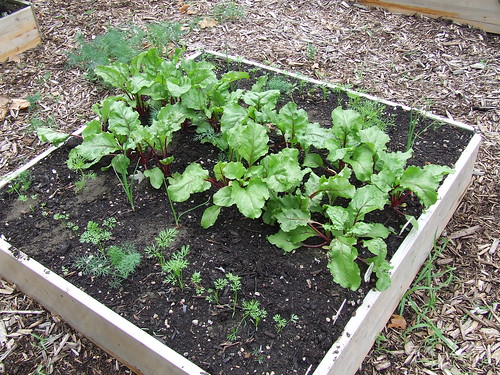
A garden created in small space.
(*photo credit)
July 9, 2025 Community Gardens and Group Activities
A Freedom Garden can go beyond being an individual enterprise involving a backyard. Some people lack individual surplus land or prefer to garden with others in a community. Fine. Their gardening could take on a community character and generally involve a piece of land divided into designated plots that are distributed to various individual gardeners. A less popular approach that could work well with a school class or similar group is to garden collectively on a single plot. The advantages of Community Freedom Gardens are obvious: people are drawn to work along with others; they can more easily learn gardening techniques in a non-threatening manner; they realize the effort it takes to produce foodstuffs; and they can exchange and share produce with others.
Community gardens could include such unused land as:
* institutional surplus lands and lawns;
* unused portions of cemeteries;
* development areas prior to construction;
* flood plains and some conservation lands;
* refurbished and resurfaced brown fields;
* agricultural lands not presently being farmed;
* areas adjacent to parks and roadways; and
* vacant lots adjacent to homes and housing developments.
Community garden success depends on how the community garden is organized. It takes some up-front planning and careful laying down of ground rules, which can both encourage the serious gardener and discourage the one who will quickly abandon the project as hot weather sets in. Abandoned community garden plots can litter the countryside, when they are not properly supervised. A strong supervisor separates the real gardeners from dreamers and encourages the wayward to continue. Once the right supervisor or coordinator is found, ground rules can be established. "Don't grow mole beans, because children may be tempted to eat the poisonous beans." "Don't overly shade a neighbor's plot." "Don't expect your vines to trespass without permission and sharing of the produce." "Share water sources."
One approach to community gardens is to plow or cultivate the entire tract each year and then allot the plots afterwards. Another method is to lease individual plots, which may contain perennials (e.g., raspberries, horseradish, Jerusalem artichokes, or comfrey) from a previous year's planting. These perennials permit gardeners to plan their work for a longer time span and to acquire a sense of ownership of a plot. A community garden does not necessarily have to be chemical pesticide-free, but still it is virtually impossible to keep some adjacent plots "organic" when others are not. The wind blows, and water run-off cannot be always controlled. One solution is to declare the entire plot as organic and distribute information for keeping it that way.
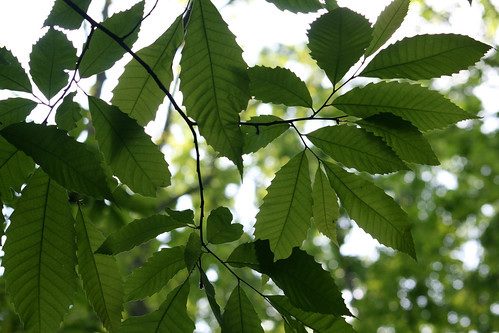
Through the branches of young American chestnut tree, Castanea dentata.
(*photo credit)
July 10, 2025 Chestnut Memories: A Wake amid Reawakening
The American chestnut forest, a principal source of mast for wildlife and supplement for pioneers, was devastated in the early twentieth century by an unexpected blight; now it awaits a new life as a natural food source for humans and wildlife alike.
My siblings and I have vivid memories of the large American chestnut snag, over three feet in diameter and ten feet tall, which stood as a gray white monument on our family farm's boundary line with our Uncle Pete's place in Mason County, Kentucky. Although both my dad and uncle were very tidy farmers, throughout the 1930s and 1940s they deliberately allowed that large tree trunk to stand as a memorial. Even more mysterious to us as youth was that it was surrounded by littered ashen gray branches and tree parts, which simply did not rot. We were too young to comprehend what species the "Big Tree" was, only that our grieving forbearers never cleaned up the littered pieces of wood, which seemed never to decay. Once we brought a chunk of that wood into the tobacco stripping room and Daddy told us to take it back, as though it was a family heirloom; he liked trees and carved with wood in retirement.
The "Big Tree" was several hundred years old and was most likely seen and its shade used as a resting place by the pioneer Simon Kenton, a friend of Daniel Boone (who claimed 10,000 acres, which most likely included this particular tract of land). Kenton spoke of staying at the "cane brakes" in the headwaters of Limestone Creek near Old Washington, Kentucky, and in our immediate neighborhood. He mentioned a strong spring of water, and that spring remains flowing today in good times and through drought. A likely place for his visit was near the "Big Tree."
During the 1880s my maternal great-grandparents, the Louis Schumacher family, lived on part of the original General Henry Lee Estate, on which "The Big Tree" stood. As a youth I recall my grandfather telling us kids how he had to go get a cow having a calf and found both animals under "The Big Tree," a half mile from his home. Again, the tree fitted into events in our family history, but the type of tree was outside of our experience as youth, for all the chestnuts had died. Only years later, when hiking in the newly established Blanton Forest Reserve in Harlan County, Kentucky, an experienced forester pointed out the unrotted stump and parts of an old American chestnut grove. This debris had the same color, texture and weight as the unrotted pieces we knew as youngsters in Mason County. Then the insight! That was why the dead snag was tolerated at our family farm. The unrotted pieces were parts of a respected dead but not yet cremated American chestnut. Today, through selective propagation and regeneration techniques, the American chestnut is coming back in traditional growing areas. See: American Chestnut Foundation 50 No. Merrimon Ave. Suite 115. Asheville, NC 28804 <www.acf.org>.
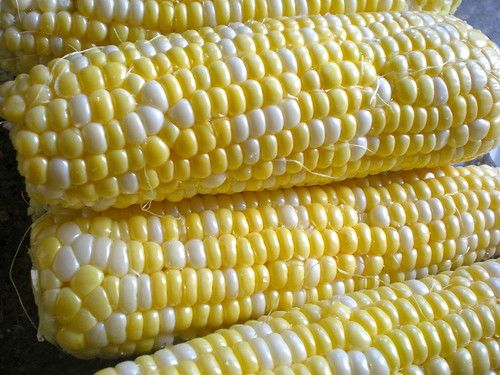
Homegrown corn.
(*photo credit)
July 11, 2025 Eleven Reasons for Locally Grown Food
1. Spirituality: Natural growth processes generate rhythms of the soul. We are spiritually uplifted in growing our own food.
2. Resources: Energy savings result from raising home-grown produce in contrast to factory farming and transporting of food.
3. Personal Control: Gardening allows our deliberate exclusion of contaminants on the produce; it cultivates an understanding that home-grown food is wholesome; it affords an opportunity to grow organic produce.
4. Environment: The process reduces dependence on factory farming in the production of the community's food. Growing local produce encourages care to avoid damaging land fertility.
5. Labor Practices: Home growers have better control of labor practices at all stages of food production and preparation. Consider the exploitation of migrant farm workers on factory farms, who are often expected to work without adequate protection against agricultural poisons and without proper housing conditions.
6. Aesthetics: Growers see value in beautifying landscape. The gardener is able to craft the garden artistically through the choice of plants, the timing of maturation, and the specific placement of each vegetable crop with intermingled flowers.
7. Eco-justice: Gardening can become a powerful political statement of social justice/eco‑justice. We will not buy products unless we are sure that workers receive a just wage.
8. Health: Obvious health benefits occur to all including older people and the young who get outside exercise and fresh air when gardening. A sense of well-being and control over one's life comes from self-sustenance and the resulting improved health.
9. Savings: Economic benefits result from growing one's own nutritious foods and sharing them with others in the vicinity. We are experiencing rapidly inflating food prices especially for fresh vegetables and those organically grown.
10. Psychology: In growing our own food we can take control over our own lives and gain an added measure of self-respect. We provide for ourselves and break the total dependence on others for our food needs -- and this encourages us to take other actions.
11. Model: We show others in the local area what they likewise can do to become self-sustaining through gardening. People tend to imitate those who are neighbors and find that learning about gardening is less threatening when it is from someone we know.

Maturing heads of cabbage.
(*photo credit)
July 12, 2025 Promote Freedom Gardens
During the Second World War, Americans were encouraged to enter the "war" effort by growing their own produce. This practice was promoted to free laborer-short farmers to produce surplus materials that could be sent overseas to feed highly stressed Great Britain and Allies, and for the service personnel that were engaged in the war effort. "Victory Gardens" became the rage and before the war ended there were some thirty million of them -- some highly productive and some heroic ventures by urban folks with small amounts of space and limited experience in gardening. The effort became a national crusade and along with home canning at converted school cafeteria and kitchens during summer vacation months, it resulted in public participation by many in local communities.
Today, we have good reasons to strive for Freedom Gardens, for all the eleven reasons listed yesterday as advantages for local gardening. In a more global sense, Americans could supply plentiful, nutritious, low-cost food so that we could free up produce to be exported and transportable in the form of root crops, grain and edible oil-bearing materials. Much of suburban and urban homes are surrounded by lawns, that consume about one-seventh of our energy-intensive fertilizer plus the fuel needed by motorized lawn-care instruments (it takes less non-renewable energy to cultivate gardens than to manicure lawns). Locally-grown produce would save the transport energy to carry our foods from distant places; neighbors could be encouraged to do similar things and through community give-and-take learn how to garden under less stressful conditions; and the beauty of variety gardens in contrast to monolithic lawns could be actualized.
The major advantage of more food, especially grown on once prime farmland-turned-suburban-residence, should not be overlooked. Many concerned environmentally conscious people talk about "farming on the edge" and mean the encroachment of development on otherwise large tracts of farmland in every state of our country. For them the future of the world's bread basket looks somewhat dire. But there can be a reversal of roles, not just the infrequent and somewhat expensive turning of roofs into gardens and solar energy plots, but the use of space around buildings and the vacant lands now in need of restoration. Gardening is one option.
Freedom gardens may not only produce a multitude of harvest crops; they may require adapting creative ways to preserve the surplus (see July 17th). The freedom garden may spawn the need to extend seasonal growth methods (cold frames, berming, greenhouses) to enhance production into the late part of the year; and they may inspire the conversion of cultivated land into edible landscapes through use of perennials.
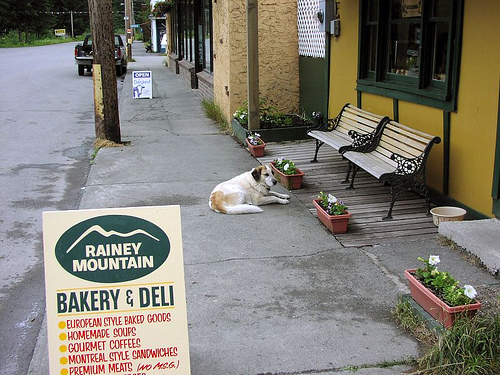
Waiting for owner to emerge. Stewart, AK.
(*photo credit)
July 13, 2025 Sustaining a Humble Heart amid Uncertainties
Come to me for I am meek and humble of Heart. (Matthew 11:25-30)
Many people have difficulty sleeping at night; this can be due to a number of factors, including worry, stress or even a certain sense of insecurity. Fear stalks many long after they have experienced some traumatic event -- an attack, a theft, a sudden death, a flood, a fire, and on and on. When will another episode occur? Will it involve me or some of my loved ones? How can we live in fidelity to our calling when we have to face the realities of what our Government calls the "War on Terrorism?" Do we wait the next terrorist shoe to fall? Is it possible to go beyond these immediate dangers and help reduce terrorism by bringing peace and justice to our world? We have our security in our God and in God alone since the world does not give it.
Among memorable events, 9-11 stands out, and many of us Americans remember exactly where we were when we found out about the event. We could not believe our ears and eyes, as those unsuspected terrorists successfully brought down the twin World Trade Towers on September 11, 2001 -- and succeeded in attacking the Pentagon as well. Yes, some people really did hate America and its military power and other things typical of our culture. The 9-11 attacks surprised us Americans who have assumed our culture to be enlightened, blessed, democratically-controlled and a model that the rest of the world wants to imitate. And security was one of these assumptions, until terrorists both here and Europe dispelled.
Granted, we Americans consume a quarter of the world's resources with 5% of the world's population, but until 9-11 that was regarded as our privilege. We had come to expect others to use the English language, THE global language. We considered ourselves leaders in everything from medicine to high technology. We thought the whole world loved us as much as we did ourselves, our democratic traditions, and our place in a globalized world. But we were unprepared for the rude awakening. Moslem fundamentalists expressed profound dislike for us and what we stand for, perceiving us as materialistic and godless -- and as successfully spreading our message to others. The 9-11 events proved this dislike.
We need now to focus on something else -- a gospel of love, sensitivity to the meek and humble -- and we can only do this by being in solidarity with others, and that is expressed through an attitude of loving meekness. St. Paul speaks about us being patient, kind, not jealous nor pompous, not inflated nor rude; this love seeks the public interest; it rejoices in the truth; it is both radical and gentle, that is, getting to the roots of problems and acting gently. Christians are committed to the ultimate victory of love over hate. A message of love is not the loudest, the most militaristic or the most economically successful.

Prairie dog(Cynomys) surveys the North Dakota landscape.
(*photo credit)
July 14, 2025 Becoming Restorers of the Landscape
Gardens are artifacts of beauty; they manifest both the cooperative handiwork of our Creator and the cooperating diligent creature, the garden-maker. They are models of restoration. The first Eden was God's sole handiwork reserved for human use and a place where people could inhabit well. Without raising their hands, these first parents stumbled, and fantasized themselves equals to God. After much toiling we human beings discover that we are not living in a pristine garden; we must help remake the second Eden, though as workers and not the supposed Master Builder.
The invitation to help remake the garden is part of the redemptive restoration, a gift of being asked to participate in God's re-creative work. What was harmed by our past mistakes is now renewed into something with our human handiwork showing in it. We are to help enhance, improve and rebuild a shattered world and return Eden to its rightful place as a fruitful garden. We don't act alone in planetary garden-making; we need the cooperation of others; we need divine assistance, and we are most definitely not bystanders. Nature is meant to be touched by human hands.
The human touch does not demean the untouched "wilderness" -- God's handiwork from the beginning before our presence. While wilderness is a counterpoint to cultivated garden plots, some of it must be allowed to flourish as a seed bed and treasure of all forms of life. Even in wilderness preservation human beings are more than observers; we are protectors and preservers of wilderness areas, which are integral parts of the emerging New Eden. Through preservation techniques we learn to tend gardens, not by converting wilderness to gardens, but by turning damaged land into ecological models of what cultivated areas should be.
This country needs to begin restoration in many areas:
* Wilderness areas -- Let's see that forested and other fragile undeveloped areas remain roadless with limited human incursion so that wildlife can thrive unhindered;
* Wetlands -- Since the first white settlement half of this nation's wetlands have been drained. Losses to these spawning places of biotic life can be compensated by encouraging restoration projects and replacing lost wetlands by artificial wetlands;
* Prairies -- Large portions of the Great Plains should be returned to buffalo ranges. In fact, the depressed economies of these areas (a number of the hundred lowest income counties) might actually be raised, if buffalo were restored to the benefit of the Plains Indians and all inhabitants; and
* Lawns to wildscape -- These are places where butterflies, birds and other wildlife can flourish. The use of native plants for cover and food are ways of reintroducing them into the region.

Toast and fresh blackberries.
(*photo credit)
July 15, 2025 Championing Quality at Harvest Time
High summer is quality growing time, and we grasp this in all its pleasant scents and sights and tastes. It is the time to stop in the cool of the day and reflect on the tripod of good gardening, i.e., local taste and fresh quality, nutritional content and productive yields. Through choice of specific cultivars within the vegetable groups (along with proper harvesting, preserving and cooking) we can preserve tastes that please the palate; through careful selection of plants good nutritional content can be secured; and through raised beds, interplanting and other intensive techniques the quality-minded gardener can obtain plentiful yields.
Current commercial mass-produced vegetables involve picking hybridized unripe produce, shipping for long distances in refrigerated units, using artificial ripening agents, and selling in a supermarket chain. The nutritional value of such commercial produce is limited when it is harvested before ripening, for vitamins and other components do not have time to develop. Commercial sellers desire products that are perfect in appearance, that is, free from blemishes, without regard to chemical pesticide presence or nutritional content loss. Chemical-free commercial (organic) produce is not easily found under such conditions and is higher priced. A wormy apple may be unappetizing but it may indicate the absence of pesticides. My finicky aunt accepted worms on or in the tops of green corn, calling them signs of chemically-free conditions and, if accidentally cooked, a bit of protein.
Today, many engage in higher-quality lifestyle practices such as smaller vehicles, less spacious homes, less fashionable clothing, more time with family (down-sizing job expectations), growing and purchasing locally-grown organic foods (nutritional quality), and more time given to the arts and music. In a world of shortages of all types we ought to emphasize bulk products (materials needed in large quantity) -- food, water, building materials and energy supplies -- from sources close at hand where quality is controlled and transportation costs reduced.
Higher quality grains, fruits, vegetables, and herbs allow for a more balanced and wholesome diet that uses less resource- intensive food. This quality diet means less use of resource- intensive domestic animal products by everyone. Unit-for-unit, the meat-, milk- and egg-producing domestic animal is a consuming agent, requiring considerable feed to stay alive, reproduce and furnish animal products for human consumption. Much grain is required for conversion to the final animal product that is ultimately consumed. Grain-fed beef is at the highest end of this intensity scale, with pork middling and poultry and fish at the lower end of the scale. Animal feed (corn, other grains, hay, soybean byproducts, and even pastures) takes up prime farmland that could be used for basic food staples for export to hungry people.
Is It Time for a Jubilee?
By Fr. Al Fritsch
You shall declare this fiftieth year sacred and proclaim the liberation of all the inhabitants of the land. This is to be a jubilee for you. (Leviticus 25:10)
America is overwhelmed by national and individual indebtedness, and this comes at a price that diverts funds from infrastructure and growth in quality of life to interest payments and with increasing burden of despair or violence. Some candidates for presidential office regard portions of that debt as a "crisis," with focus on student debt that hangs on for decades. I have never addressed this indebtedness as such but do recall that our Judeo-Christian tradition does speak of a liberation from debts in a year of Jubilee. Political realism demands that we address these financial conditions even while solutions are quite difficult.
Michael Hunson asks "Could/Should Debt Cancellations be Reintroduced Today?" <https://michael-hudson.com>. He raises some vital questions about benefits and risks involved. I am aware that an immoral worsening condition exists where inequality abounds with wealthy accumulating at the hands of creditors at an ever accelerating rate and the indebted sinking into ever deeper financial bondage. The type of debt makes it necessary to focus on certain classes of debtors, but mere forgiveness may not be the best in certain circumstances that may cause the credit debt to actually be enhanced. On the other hand, for those with health related debts and student loans needing repayment this could be a true liberation from enslavement.
Personal debt is the current focus with national debt to be considered later. As in 2024 that indebtedness (mortgages, auto, credit, student and other) reached the highest ever at 17.94 trillion or higher. Senator Elizabeth Warren regards the student portion of that total (1.773 Trillion) to be a matter of crisis and many others are starting to agree. The "other" portion includes health bills that mount for unfortunate victims and these poorer folks do not have attorney fees capable of legally declaring bankruptcy. Needed radical changes, which in the past occurred through revolution, war, pandemic or national collapse may be called for through non-violent means. Is this needed to address portions of personal debt loads?
Frequently, in the long financial history of the world, the burden of personal debts was removed though circumstances that have changed over time. In fact, jubilees were regular practices in the ancient Near East when most indebtedness was to the leaders of the national government; new rulers upon ascending the throne would proclaim edicts that would eliminate existing debts, thus reintroducing economic stability to the land; bond servants would be returned to their homes and liberated citizens would furnish labor and military service for the new monarch.
The Mosaic Law presented the ideal of a liberation or Sabbath of Sabbaths (49) every fiftieth year when agrarian debts would be relieved and land returned to original debtors (see Leviticus 25). The Sacred Scriptures clearly called for social justice, whereby the indebted could have a fresh start in an atmosphere of economic freedom. Today, indebtedness includes immense national debts and the creditors are a mixed lot with intermediary agencies holding and distributed the debt to corporate bodies and investors even in foreign lands. Was this idea of liberation an actual event or only open to creditors as a way of proper behavior before God? We are unsure, but are alert to debt-related social injustice and enslavement.
Jubilees are rarer in recent history. Actually, one recent successful one was the 1948 Allied Currency Reform in Germany that liberated the average citizen (not businesses) from debts generally directed to the defeated Nazi regime. American history had instances of national modified debt relief (1841 and again in the 1930s) and the Biblical jubilee quotation is found on our liberty bell "Proclaim liberty throughout the land." Can something be again done since our nation has the highest indebtedness in history and, as occurs often in economic history, the wealthy 1% are reaping in half of the advance in income each year as inequality mounts and the lower income classes stagnate? These virtually stagnant incomes do not match growth in productivity of employers. Change is in the air and will it be non-violent?
Forgiving some debts is a moral issue. Imperfect human beings need a time to start over, for many experience false starts and burdensome detours in life. God's mercy brings forgiveness; so ought our human mercy. However, what about a bad credit debt where consumers did not manage limited income properly and follow the allurement to spend "future" money on unnecessary items and services with no heed as to how or when it will be repaid. To forgive those who were thoughtless and with resources belonging to the commons is not really a proper moral practice. Furthermore, who is the moral judge who must decide whether an individual should be debt forgiven or not? It is unfair that the frugal have to bear some of the costs of this jubilee event. Not all debts need to be forgiven when the indebted can pay over time.
What about unfortunate and unexpected debts? The current system of bankruptcy exists for those unable to pay back over a reasonable time period, or a legal system made operative that allows for a paced payback according to reasonable means. Actually, access to legal advice needs to be provided to those unable to secure a lawyer due to inadequate funding at this moment. Laws need to exist that payment will come from assets or other means over a time period rather than being up front. However, once said for those with enormous medical bills, still most individuals do not want the blemish of bankruptcy hanging over their overall credit history. They would prefer to pay their bills and be known for doing so. Still personal choices due to substance abuse or false choices in higher education places some blame on debtors. The situation needs continued refinement. See next week.
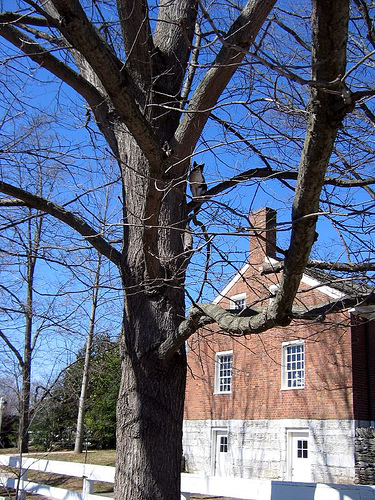
Cat in tree, Shaker Village of Pleasant Hill, KY.
(*photo credit)
July 16, 2025 Food Distribution Systems
I serve an Appalachian county with a 20% of population poverty rate along with high drug use and overdosing. As one might expect, some of our residents run low on food, especially at the end of each month. American government's (federal, state and local) food sources are generally available but not completely adequate. Food stamps are available for those in need. One difficulty with this system is that it includes soft drinks in some states.
A more specific government program is WIC (Women, Infants and Children), which provides food, health care referrals and nutrition education to low-income pregnant, breast-feeding and postpartum women as well as infants and children up to age five who are found to be in nutritional need. A third government distribution program (when more food surpluses are available) is the federal commodities program that has dispensed peanut butter, cheese and a good variety of nutritious commodities to those who qualified -- and is highly popular in this county.
Garden produce and other food surpluses such as wildlife from hunts are available at various times of the year. Sharing these with people who are in immediate need or who can preserve the surplus in some fashion is ideal for addressing hunger. However, sharing game is quite seasonal and does not necessarily mean that the surplus reaches those in greatest need. Second Harvest programs are available in some places; these groups identify outlets for slightly outdated and unsold perishable foods and collect and distribute these materials to the homeless and lower income people. Again, the program depends on random conditions.
Meals-on-wheels distribute prepared dinners to the sick and elderly; this is generally church sponsored. So are local programs geared for Thanksgiving or Christmas or particular times of the year? An ability to carry on a program or office with food surplus for those in occasional need is very important. My two parishes keep a surplus supply of food; this is welcome in many emergency occasions when the food storage runs out.
While talking about existing programs of immediate food needs we need to remember that many suffer from low wage jobs that do not allow them the money needed to purchase food in a dignified fashion. Far better than these distribution systems is a healthy minimum wage ($15 an hour) that would give many of the working poor the advantage of controlling their own food needs. However, such freedom should be coupled in some way with the ability to cook and prepare meals from simple far less expensive basic ingredients and abstain from prepared commodities that can eat up a food budget. Our "Moms in the Morning" program trains homemakers in use of basic staples (whole grains, cooking oil, canned or dried milk, and beans or equivalents). We do not yet have a perfect world, for there will be hungry people tonight.

Milkweed in full bloom at Tom Dorman State Nature Preserve, KY.
(*photo credit)
July 17, 2025 Food Preserving Techniques
The bounty of this harvest makes us more conscious that we should not waste what has been produced. Some portions can go to those in the community who lack fresh produce; other portions can supplement the non-growing part of the year. From the times of our distant ancestors, foresighted folks dried, stored in the ground (less susceptible to theft and confiscation) or preserved foods through salting, canning or other ingenious means. Their goal was to save quality while retaining edible variety of nutritious food.
Root Cellars are partly or totally submerged outer buildings or interior space. They are dark and cool places at constant temperature and controlled humidity where produce could be preserved for months. Store here all root crops plus winter squash, pumpkins, brassicas, apples, pears, and wrapped tomatoes.
Canning of fruit, berries and vegetables takes great effort in the heat of summer, but the products taste great in winter. I can recall my mother making such great sacrifices and being so proud of the materials she canned. She would take visitors to view the fruit of her labor and to enjoy the colorful and tasty food.
Pickling has been around when common salt was available for curing hams and other meats through processing, dating back to Celtic hams being transported to Roman overlords two millennia ago. Besides meat and fish, "pickling" extends to cabbage (sauerkraut), cucumbers, turnips, watermelon rinds, and many others vegetables.
Freezing produce is a convenient food preserving method, but generally uses non-renewable energy to operate. Some products such as beans do not fare well through freezing, but the method works well for corn, peas, tomatoes, cherries, berries and many fruits.
Leaving root crops and other vegetables in the garden is the simplest preservation method in temperate areas; time left depends on winter severity and amount of protective cover. In Kentucky, carrots, Japanese radishes, Jerusalem artichokes and turnips can be left in the ground. Likewise, mustard, kale, turnip greens, and collards will stay fresh, if protected from wind and intense cold.
Solar food drying includes dried apricots, raisins, prunes and dried apples). Solar dryers can be made from scratch or purchased; they allow solar warmed air to flow over porous screened trays of cut fruit or vegetables, protected from direct sunlight but with a flow at about 110 degrees Fahrenheit. Screens at air openings will keep out insects. Retained nutritional content exceeds temperatures needed for canning. Solar energy is free, allows easy storage with less volume, and avoids spoilage problems. Even juicy fruits like tomatoes can be turned into "leathers." Also dry pears, onions, carrots, rhubarb, turnips, pumpkins, beans, cauliflower, broccoli, corn, squash, mint, bay leaves, dill, garlic, peppers, ginseng, basil, parsley, and other herbs.
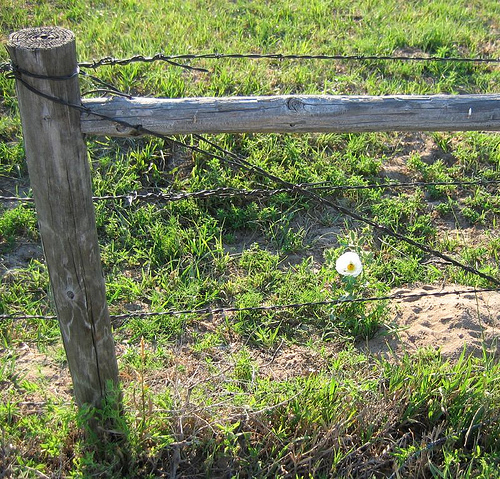
Prickly poppy, Argemone albiflora, along western Nebraska pasture fence.
(*photo credit)
July 18, 2025 Resource Self-Control
Wasting is wrong, but many of us never consider the moral implications of resource misuse. We try to halt waste to save money or because the throwaways are inconvenient or unsightly. But what about the morality of our throwaway culture? When someone wants to discard unfashionable clothes they salve their consciences by giving the discards to charity. We throw out food because we do not like the inconvenience of cooking with leftovers or consider it out of date. We neglect to turn off lights through forgetfulness. We fail to turn so-called kitchen waste into compost and yard wastes (grass clippings, tree trimmings, etc.) into compost or mulch. With proper foresight, the valuable living topsoil in development projects could be saved during construction operations and restored around many of the less densely constructed houses to become cultivated space, but this practice is often neglected.
We like to be in control, and there is something satisfying about that. We don't want others controlling our lives; we prefer to remain conscious in health procedures; we strive to be the "captains of our own fate." Let's face it, not all things are under our control. We did not choose how we were to be born, who our parents were, and how we were launched in life. We did not control the beginning situation, which has much to do with the rest of our lives. In the same way, we have little to do with the time and place of death and most often even the manner of it. We are at the Lord's mercy. But between our beginnings and ends we could exert some control mechanisms.
We have responsibilities where controls enter the picture; we have free will, our ability to choose to act or not act and to choose this or that way of acting. We can accept and enhance our living circumstances; we can help create opportunities to give, love and we can share with others. We can cultivate the gift of self-control as part of our free choices; practicing self-control over our eyes and heart and mind allows us to focus on important decisions we must make including lifestyle choices. We need to see these moments of discernment as part of our proper journey of faith. Then and only then do we gain the habits that allow for self-control, for saying "no" to excesses, for moderation in food and drink, for realizing our own weaknesses, and for finding the grace to favor self-control in all matters.
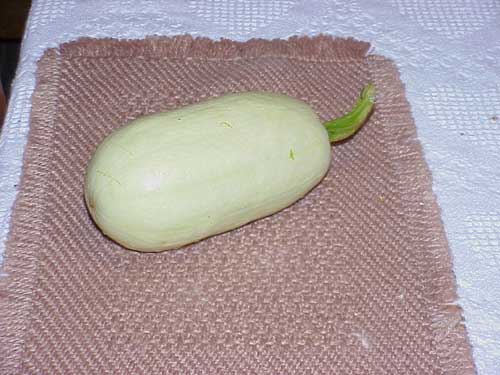
"Volunteer" squash, a treat for the senses..
(*photo by Sally Ramsdell)
July 19, 2025 Farmers' Markets and Other Produce Sources
My Grandmother peddled homemade butter to certain choice customers. My mother did the same at times with strawberries in spring, plums in summer and with autumn kale and mustard. These were part of a culture that sold specialty items at a certain time of the year for pin money. Yes, in many parts of the world small-time gardeners want to make a living by producing food commodities, and others want to supplement their income by the sale of surplus produce. The target market is quite important for them as well as the hope that they can grow something that has a demand. Even today in this country, individual producers prefer to bring a quantity of the fruit of their labor to a farmers' market. This offering of surpluses works in hope of finding willing customers.
Another marketing approach is designed for those seeking to make a total living out of gardening; this is the "CSA" or Community Supported Agriculture. Usually this consists of receiving a determined sum of money from a customer (some perhaps up front) with an understanding that a satisfactory basket or fresh produce will be delivered by the producer on a periodic (often weekly) basis. The guarantee means that the grower needs to think ahead of a variety of vegetables and herbs that will yield results at a given time for designated consumers. The success of CSAs depends on weather, planning, luck, and diligent work.
A third approach is to deal with food wholesalers and processors. One approach is through marketing cooperatives. Food marketing coops require planning, standards, type of material, grading of the produce, and determined sales destination. The agricultural commodity determines the nature of the marketing coop. My folks were members of a tobacco coop; as prices rose, more growers got into the act; when prices fell, some were hurt due to overproduction. Therefore the tobacco marketing coop controlled production so all would benefit. It worked well for several decades even though the ultimate product was greatly misused.
Annual vegetables and herbs are commodities of choice, for all like fresh produce during the growing season. However, overproduction can be detrimental to the enterprise for most items. In our area wild ginseng, a medicinal herb, has a global market interest ($1,000 a pound fresh); it grows slowly and takes over a dozen years to mature, but is subject to theft if the location is known. Most vegetables and herbs are not of such high market value as ginseng; they are more subject to price fluctuations and uncertain marketing of perishable produce. Creating a marketing cooperative takes a public organizing effort, but this could be opposed by those, such as ginseng growers and gatherers, who prefer secrecy for security purposes. Marketing together does have the advantage of cooperative rather than competitive efforts. Food cooperatives to succeed; they have advantages for producers.

Flowers of the mimosa.
(*photo credit)
July 20, 2025 Becoming Soil for Good Seed
Just as from the heavens the rain and snow come down
and do not return there till they have watered the earth,
making it fertile and fruitful,
giving seed to those who sow and bread to those who eat,
so shall my word be that goes forth from my mouth;
it shall not return to me void, but shall do my will
achieving the end for which I sent it. (Isaiah 55: 10-11)
We need to see the connection between the fruitfulness of Earth and the fruitfulness of God's Word. Jesus likens sowing and the falling of seed on various places with the fruitfulness of Word. He tells of some seed falling on rocky ground and lacks roots; some falling on paths and eaten by birds, some seed choked by the thorns -- and some seed falls on the fertile soil and yields a manifold harvest. When we hear this we are led to ask ourselves, does the Word enter me on paths or rocks or thorns or on fertile soil that is my environment for good returns? Do we enrich the soil so it can be productive? Does a humble receptive heart become the humus in which the Word can thrive and reach out to others?
1. All are entitled to the goods of this world in the proper degree needed for their better quality of life. The commons are truly commons -- and that takes a fertile mind and heart to understand and help bring about. If the Word is to grow, we open our hearts to bring justice to a troubled world. All resources are to be shared within the human family.
2. We Christians believe in the power of the Word. Jesus shows this power emerging in the long story of the Old Testament, the power of the prophets of old, the force that moved John the Baptist to go into the wilderness in order to call people to correcting their ways, the announcement of the Kingdom and the teaching of it in the Gospels by Jesus, the coming of the Holy Spirit, and the touching of fearful individuals making them the proclaimers of the Good News. These became courageous models for spreading the Good News in quite succinct and emphatic form and touched the ears of recipients who rose up to follow the Spirit.
3. We can do it. If we believe in the continuity of the Good News today, we have taken on the role of sower of seed as Jesus tells us (Matthew 13: 1-23). Today this Word needs to be spoken out of justice for our individual and collective salvation. Our faith extends beyond belief that God will do miracles; our faith includes the power for us to act as a confirming sign of the Spirit empowering us here and now. We are God's hand in giving those who seek their daily bread, and so we are part of their answer to prayers through our generosity.

Rose acacia, Robinia hispida. Red River Gorge, KY.
(*photo credit)
July 21, 2025 Domestic Potable Water Supplies
A major problem facing the world's people is a sufficient amount of potable water. Parts of South India are contesting limited water supplies; so are those who live in America's Colorado River Basin. Many people are realizing that with droughts, water consumption is highly limited as the people of California are still experiencing to some degree. Must water for drinking be only obtained by the purchase of these little plastic bottles, and in the process take free water from being a right to now becoming a purchased item? Accessibility to free water is fading.
Chlorination is the most common way to purify municipal water, for it kills harmful bacteria and has been credited with controlling the scourges of cholera, typhoid fever and dysentery, which plagued our ancestors for centuries. Proponents of chlorination realize its practicality and economy. Some municipal systems use hypochlorite compounds and some other forms such as chlorine gas -- which is quite toxic, if emitted accidentally into the atmosphere. Some chemical water contaminants, which are present and have escaped previous purification, become far more worrisome if chlorine is present; among by-products from the chlorinated water medium are the trihalomethanes, which can prove harmful in even small amounts. The federal government orders such chemicals removed to the highest degree before chlorination.
Due to dislike of chlorinated water, Americans spend a billion dollars annually on bottled water. Today, plastic water bottles are in vogue, even though commercially bottled water is sometimes of questionable quality. State regulations for "mineral" water vary from state to state; the minerals are of questionable origin; the quality of water may not be better; and "natural" may mean tap water that is repurified. The term "sparkling" refers to water into which carbon dioxide gas has been injected to make it bubbly.
A relatively low-cost home water filter can improve water taste, reduce odor, and remove the chemical contaminants just mentioned. Granular activated carbon filters have been used as pour-through types, faucet filters, stationary filters, line bypass filters and double filters. Water moves slowly through the purifying material, and recent commercial porous filters allow more rapid filtration. While good for removing bacterial contamination, they may allow some impurities to be present. If impurities are few and the water is not already chlorinated, these low-cost ultra-fine commercial filters work well. Boiling water kills bacteria, but takes fuel unless a solar distilling device is used. Ozone kills micro-organisms as do ultraviolet methods, but such domestic devices are costly and work best with higher quality water.
One domestic water compromise is to accept the municipal system but add a dual one for water use in the garden, either a large water-containing cistern or a simple fifty-five gallon rain barrel at the residence; I use both in my garden in dry times.

Male eastern swallowtail, Papilio polyxenes.
(*photo credit)
July 22, 2025 Using Food Storage Space Well
Quite often domestic space for larger families or for accumulation of excess equipment and materials is limited. While some of the items are seldom used or out of fashion, they may take up quality space that could be used for other more essential materials -- including our monthly food supplies. Making room may mean using basement or attic space for food storage and drying, or expanding shelf space to hidden and forgotten places.
Providing domestic storage space for food has advantages:
* During an emergency (floods, snowstorms, earthquakes) the local food distribution system may be disrupted and your personal domestic food supply will come in handy for residents and even neighbors. Some homemakers take delight and comfort in having a month's supply of canned or dried food on hand just in case;
* Canned food storage can be a mark of good housekeeping, and the products of canning are really a beautiful sight to behold in a thrifty household. The colorful array of food in clear jars can be quite decorative, and so some create storage space by installing "open shelving" in various prominent parts of the house/work areas;
* Discover additional storage space under beds, in closet upper shelves, in basements and outbuildings (provided weather is moderate), and within stored empty containers (provided one does not forget about the stored food);
* Proper storage of lower priced foods purchased when "in season" or "on sale" can be a good food budget strategy and investment. All too often some storage space may be ample if the space provided is not too humid or too hot or too cold;
* Stored staples can become a hedge against escalating food prices, and shows a thrifty food purchaser. When on the lookout, the sophisticated shopper can find bargains in various places;
* Storage space, especially roots cellars and canning shelves, encourages the practice of preserving food for longer-term winter months during the non-growing season; and
* Ample food storage space can permit fewer trips to the grocery market, especially if your own garden is furnishing your everyday need for fresh produce. It is wise to reduce food trips by a monthly purchase -- and an observant outlook for those special sales mentioned earlier.
We are all reluctant to throw things away, to sort out what we have, and to store goods properly and where they can be easily retrievable. A perfect remedy for people with a shortage of storage space is the yard sale, but such materials could simply shift from my storage space to the neighbors.

A field of dandelion and daisy.
(*photo credit)
July 23, 2025 Weeds and Tolerance
And you taught your people, by these deeds, that those
who are just must be kind. (Wisdom 13:19)
We continue today the agrarian motifs used by Jesus in his parables in Matthew 13. We need not be grain growers to understand the parables however, for even average people know to what extent weeds can choke cultivated areas. However, secret "weed" sowers may be mini-terrorists who seek to entice others to agree, to consume as they do, and to succeed by going along with the crowd on whom they have considerable influence. The weeds become the consumption habits that come to play in our world and crowd out the essentials that are needed to keep all alive but tranquil. Weeds then become luxuries that some have and others do not; however, for us to overly root these out could create a major disorder in our social system. Should we "tolerate" the misspent luxuries in our midst, while thousands of kids in other lands die each day from lack of proper nutrition to ward off opportunistic diseases?
Tolerance may be used in different ways, but it may be confused with permissiveness. A parent who allows one child to beat up on another is not tolerant; that is crass indifference or neglect. If tolerance allows some secret "weeds" to draw the attention and entice others, it raises questions. To what extent must we have forbearance and be patient with our fellow human beings, even when they are overly "weedy" in their lifestyle and practices. To negate enticements severely is a form of intolerance that has proven quite cruel in past history and has no place in a modern democratic society. Here tolerance is allowing "weeds" to be present if they do not poison and choke the good seed.
What if the weed sower so overwhelms the farmer that weeds become the major crop and the weed sower is not secret about sowing, but takes delight in publicly overpowering the farmer? Where is tolerance now? Does tolerance become our willingness to allow the weed sower to overcome the sower of good seed, and to take over the resource that belongs to all the people who desire an honest living from grain grown? Do weeds become the luxuries of life, the enticements that choke out wholesome living practices? In order to respond for the defense of those who need the grain for basic food we must -- recognize that weeds are being sown; confront the public weed sower; and stop such affluent and wasteful practices for the sake of those in real need.
Silence and permissiveness are not proper forms of tolerance when we can stop the weed sower while in the act of sowing. Once sown is one matter; the current act of sowing is another. This may go beyond today's parable of patience and forbearance but it is related. Tolerance allows some weeds that do not seriously threaten us or others; saying "no to certain "weedy" acts that hurt other is to defend justice. We must know the difference.

Wild blue iris near rural pond.
(*photo credit)
July 24, 2025 Climate Change and the Poor
In this year when convincing evidence for climate change through human causation seems so evident it has bothered many Americans when discovering that climate change deniers have never lost drive -- and vast financial support. Too often the telling effects are years in the offing and so the more selfish soon dismiss change results for they will not affect me in my lifetime. And older ones are quite aware that it is a future generation who will suffer consequences of rising oceans and extreme weather events. Arctic regions have had the greatest early impact and now entire villages are losing permafrost foundations and slipping into a warming sea. Soon Pacific Island Nations will soon disappear.
Where does climate change fit into the global picture? Yes, the northern temperate zone is extending further north in Canada and Russia, and especially Siberia. With possible erratic weather associated with this dramatic change, some areas in Africa and Asia and elsewhere could become dryer. Already deserts have been extending in northern China by a million acres a year, although hopefully this can be stopped through reforestation and protected grass cover. Climate change could extend African desertification in such poor countries as Niger, Chad and Mali, and these can ill afford further surrender of pasturelands to desert. Our American southeast may become dryer even if not a desert. If possible droughts hit major food-producing regions such as the American or Canadian Midwest, Australia or Argentina, food shortages will be exacerbated. As in times of shortages drought results in a ripple effect with the richer food importers taking in more of the scarce commodities and the poorer lands being squeezed still further through shortages and higher prices.
If icecaps continue to melt and oceans rise a number of inches or feet, one can expect entire island nations to be submerged and thus suffering compounded as people are forced to move to already heavily populated areas. Such nations as the Maldives, Fiji and a number of Pacific Ocean lands are quite concerned. An added concern is that the change of water flow in major rivers that furnish water for India, Bangladesh and other Asian lands could affect rice and other food-growing programs.
We cannot escape what could be like ostriches with heads in the sand. Climate change will affect all through food shortages and higher prices, along with mass migration from affected areas to wealthier nations. Each citizen has a responsibility to help elect officials who understand the gravity of the situation and are accountable for initiating policies that address climate change. No one is immune because of privilege. We are one world or at least we must become one -- ASAP.

Daylily at sunset.
(*photo credit)
July 25, 2025 "Affluenza" versus Simpler Living
Our over-indulging consumer culture suffers from a disease that some term "Affluenza," the ill effects of an overly affluent society that uses too much and is unable to control what is under one's care. Just as destitution is undesirable, over-abundance at the other end of the consumption spectrum has its negative effects. A happy medium is the space in which material goods are not too scarce nor too abundant and are used responsibly. When speaking of food, "use" means moderating the amount of intensive-resource foods and opting for simpler foods. Perhaps as many as a billion people in this world suffer from near destitution. Another billion lacks decent affordable housing and safe drinking water.
On the other end of the resource spectrum are those who take and use far more than is needed for a healthy life, e.g., the top 1% of Americans who own over half the wealth. In fact, just as destitution is an unhealthy condition, so is overabundance or affluenza. The latter is unhealthy spiritually (leading to insensitivity and selfishness) along with a temptation to consume excessive amounts of resource intensive food. Furthermore, this is not just a food condition: overabundance leads to insecurity and overstress in maintaining extensive possessions: vehicles, gadgets, estates, houses. Time is consumed with keeping up with the Joneses and maintaining a privileged fashion expected with a certain status or position. Quality of life deteriorates with such concerns.
A higher quality of life can only be found in a middle course between destitution and overabundance -- and that can be a rather broad zone as to what constitutes sufficiency, and what is overwhelming luxury? The hope is that simpler ways will become more enticing and that their values will become evident in a world that is limited in accessible resources by those in need. However, honesty makes us ask whether the majority of lifestyles can change voluntarily or whether they must be modified through deliberate and even drastic legislative measures. The middle course calls for rational and willing cooperation among democratic people so that the commons may be reclaimed by all and for the benefit of all.
A more troubling question is whether people can undertake the middle course, if addicted to materialistic consumption. Can they voluntarily come to simplicity under certain conditions, especially if they are among the great majority of Americans bombarded by advertisements to buy, get a credit card, gamble and just consume? Addictions abound and are seen in overdose deaths among the poor and the rest of the population. Do we continue to fool ourselves, thinking our consumption is under control, and attribute affluenza to the next person? Should we regulate excessive lifestyle and follow the example of our anti-drug, anti-smoking, or toxic chemical campaigns in regard to consumption ways?
The National Debt
By Fr. Al Fritsch
For those of us fiscal conservatives the notion of a national debt is quite disquieting. To think that in the past few economically healthy years our national indebtedness has grown annually by over one trillion dollars; this puts fear in the hearts of every fiscal conservative. Yes, our nation's debt grows annually by $4,000 per person even while we are "prosperous." I do not want that debt burden, but why should other sane people? How do we so overspend our taxable income by such an amount when we should be paying down that debt? How can it be eliminated when a renewable economy is being born and the need to focus on infrastructure rebuilding is so urgent? Are we digging an ever deepening hole due to unnecessary military expenses that only enhance the voracious industrial-military complex?
How big is this debt? It is rising for this decade at a rate of almost a trillion dollars a year and will reach $35.46 trillion at the end of 2024. That comes to $75,000 (and counting) for every man, woman and child in this fair land or in more practical terms $177,702 for every American taxpayer -- and some billionaires are outside this categories for they take no income.
Who owns this debt? It can be divided four ways: U.S. Investors 32.5%; foreign investors 29.3%; Federal Reserve 11.2%; and U.S. Government 27%. Some of this remains a mystery for those of us with less economic experience. The one category that would be hurt by an anarchical decision to abolish the debt would be American investors, and the hurt ones who would scream at the U.S. economy would be foreign investors. The other two categories would be to balance or zero out the governmental mystical categories.
What causes the increased debt? That answer is quite simple and does not relate to the state governments that cannot incur longstanding debts like the federal government can; as a nation we simply spend more than we take in for revenue. The wealthy call for "no new taxes" -- and of course the poorer taxpayers agree; they do not realize that privileges to the rich are already cutting heavily into possible positive payments of our national bills.
Can we reduce the debt? Amazingly, few seem that interested in curbing and eliminating that debt. It would seem that this should be a Republican issue, since they are often considered the conservative portion of the political spectrum, but are they? Without a base pressure group we can expect the debt to continue to rise, for few want to disturb the gravy train. Actually, two simple ways could be presented, but would a militaristic legislator and administration agree? The first is a drastic reduction in military spending -- not curbs in social security or other programs affecting poor and low-income folks. We do not have to build and maintain these super expensive aircraft carriers -- the global sitting ducks -- nor the hundred million dollar aircraft with no comparable competitors anywhere in the world. The second is to institute fair taxes that quickly target billionaires and wealthy corporations.
Should the debt be upped? There is no good reason for increasing the indebtedness of our nation. We are the wealthiest nation in the world and it is within our means to raise the money it takes to keep us in good standing within the world economy. However, there is no reason we must be the policemen of the world and hold a military budget far greater than other nations along with the payment of past military indebtedness. Let's be sensible and correct this budget and curb hundreds of billions each year, thus bringing expenditures in line with income. Secondly, let's increase income through removing extravagant reductions and tax benefits and add those of a wealth tax on the superrich who do not "have" incomes but flourish through property value accrual. Both proper curbing and fair taxes would stop a need for such debt.
Can fiscal bipartisanship be possible? What has happened in recent years is that pet liberal and conservative programs and projects have been continued as part of the art of kicking the can down the road. Neither party wants to undertake the somewhat difficult task of saying "no" to certain extravagances in their districts, especially military ones; they are tempted to cut social benefits to the objections of liberals or military expenses to the objections of many conservatives. A new set of rules will be necessary if we are to begin a fair project of paying federally for higher education and to forgive both student loans and personal indebtedness resulting from health care costs as discussed earlier. Our nation demands that both parties work jointly for a compromise.
Will the new renewable energy economy be hampered by debt?
Negative curbing and restrictions on wasteful practices are only half the struggle; the other half is more positive steps at promoting a decentralized independent citizen-benefiting renewable energy economy. This is in contrast to current Big Energy role in the economy. Surprisingly large current subsidies for fossil fuel could be transferred to expanding renewable energy sources. This could become a green light for more rapid renewable expansion, which is not expanding fast enough to offset increasing global energy demands. Tax incentives will help expand solar, wind, hydro, geothermal and tidal along with the beginnings of a hydrogen fueling system (with less preparatory and no final emissions).
For all intents and purposes we must become more fiscally conservative because indebtedness breeds disrespect for a sound fiscal system. Furthermore, more funds are needed for expanded educational and health benefits, as well as long-delayed infrastructure maintenance and expansion. Pursuing a more conservative stance we could still find the funds through fair taxation of the wealthy and the curbing of military expenses to take on a less global role. We must learn to bite the bullet even when this takes spiritual willpower which is currently in short supply. But it can be done.

Fresh mulberry, Morus rubra.
(*photo credit)
July 26, 2025 Overcoming Food Wastes
Many will ask "why concern me when I do not waste?" Perhaps each can excuse him or herself and feel better, but food waste is all around us and in some ways affect us all. Many educational and business institutions waste and know they do, throwing out discarded and outdated materials that are good enough to process and use -- sometimes a third to half of their food materials. They suffer from rigid dating and other procedures, but more could be reused or given to the poor and soup kitchens.
With an emerging world's food crisis, any waste of food is simply morally wrong and should be curbed if possible. Let us examine our own domestic food practices both for ourselves and those who live with us. Do we throw out perfectly good food because we are tired of it, we prepared too much, or we prefer a change of menu? Will someone in the household complain about leftovers? Some general food use rules are worth resurrecting: consume only to the degree needed; reuse where possible; and only dispose of when absolutely necessary. Deliberately avoiding wasting food in this food-short world is the first step in becoming food conscious. It is wrong to waste because we have the plentiful bounty to replace supposed deteriorating quality with fresher materials; a little left over was a cultural sign of plenty.
Reduction of wastes can occur on either end of the food production/consumption chain: growing, processing, transporting and selling on one part and buying, cooking, reusing leftovers and preserving at the other end. Harvesting often leaves good but imperfect-looking produce in the field. Grocery stores often throw out animal products (meat, milk products and eggs), baked goods, and prepared salad materials that are past due dates, but still are edible and acceptable. One local brave soul took wasted animal products before losing refrigerated conditions and redistributed to poor folks -- until the food market personnel guarded the dumpster. State laws related to reuse of food are sometimes excessive and require institutions to discard uneaten prepared foods in restaurants. Changes in state and local regulations can allow reusing leftovers by Second Harvest and soup kitchens.
Personal changes can make a difference in amount of domestic wastes. Over-cooking without regard to reuse is another source of food waste. Creativity comes in reuse of materials such as meat and vegetable leftovers in soups, stews, hashes and other dishes. Hungry individuals often take certain large size portions because they paid for them or because a restaurant serves large portions through its generous traditions. Furthermore, smorgasbord operations result in large amounts of waste by consumers who take far more than they can eat. How do we penalize waste? Patient education from young to old is needed without becoming pestering. Don't try to stuff a person at a single sitting, for some observe that overeating can also be a form of wasting food at the waist.

An abandoned farm, reclaimed by nature.
(*photo credit)
July 27, 2025 Restorative Justice through Community Service
Anyone who has any connection with correctional institutions in this country wonders at least once in a while whether the word "correction" is used properly. Are the federal or state prison practices truly restorative or transformative approaches to justice, or is there big governmental interference in a corrective process that could be best done on the local community level? Those who study justice and corrective approaches in other cultures wonder aloud as to whether the American massive outlay of prison resources for the enormous numbers incarcerated is a reasonable system. Could not the communities distribute justice better by integrating these offenders into ordinary community life?
Some argue that correction is more than simply punishing people who break rules; rather, responsibility on the part of the lawbreaker ought to be enhanced so the person can return to becoming a productive citizen in our society, not a person sitting in a cell or even earning a small wage at an in-prison manufacturing plant. The retributive justice system -- the prison walls and razor wire fences -- does not work well. It distances offenders from needed reform of their behavior and from the community that ought to be opening to a fuller integration of the offender into society.
On the other hand, restorative justice that has been practiced by many primitive societies emphasizes the community contribution that is owed by those who have committed some offence. In fact, many experts call this a truly democratic process that could be part of American tradition, which includes full participation and consensus among all parties -- the people in general, the offended, and the offender. Healing is needed. "When imbalance and disharmony are a regular feature of community life, it should be no surprise that crime is too." (Susan Sharpe, Restorative Justice: A Vision for Healing and Change [Edmonton: Edmonton Victim Offender Mediation Society, 1998] p. 4.)
A long-time environmental colleague, Ernie Muhly, speaks of justice being reciprocal: in asking offenders to be more accountable and responsible in the community, it asks the community to be more responsible in how it treats offenders and obligates the community to find ways to help them learn accountability and responsibility. Since a system of justice that increases understanding and empathy in a community also enhances people's sense of responsibility to each other. It counteracts crime more effectively than one that brands felons as scarred, handles them disrespectfully, and increases their latent anger. Restorative justice is a compassionate listening that begins with the recognition that it is people, not governments, who are hurt by criminal activities and need a restored sense of safety. Individuals doing supervised community service can restore responsibility on the part of the offender and safety and integrity within the community.

A black-eyed susan, spotted in late July.
(*photo credit)
July 28, 2025 Wildscape and Wildlife
A wildscape is an ornamental landscape that serves several purposes: it can be quite naturally beautiful; it requires less effort to maintain (no frequent mowing); and it offers nesting and feeding places for butterflies, birds and wildlife. Wildscapes, when well designed, become a safe habitat for wildlife. Like work and rest, the combination of cultivated and wild space is harmonious and adds balance to the landscape. Increased wildscape is essential for beneficial insects and birds, which are so hard pressed by the decrease in wilderness areas. Wildlife conservation is a worthwhile goal, and wildscapes attract many species of birds and small mammals, which are under stress today due to destruction of traditional nesting and feeding areas.
Determine the area of your yard that should be in wildscape, where colored wildflowers stand in contrast to solely green lawn. Prepare the ground for the wildscape according to soil requirements and weather conditions. Usually, the initial plot will need tilling. Sow wildflower seed as recommended for your region; seed selection depends on temperate zones, soil type, shading, and desire for a native domestic wildscape. Experiment with varieties. Obtain commercially available native wildflower or prairie grass seed, or seed collected from other local wildscapes. In autumn, gather the wild seed and use it to expand the wildscape, keeping long-term costs low. Border the primary wildscape with brick or stone to show neighbors that a wildscape is deliberately intended.
------------------
Wildscape
Where a lawn of bluegrass in regimental code,
Once was sowed, mowed and chemically bestowed;
Now dare we grace this untamed place,
With chicory, cornflowers, Queen Anne's lace?
Phlox and yarrow with spring beauty whose
Colors bemuse, patterns enthuse, scents transfuse.
Weekly altered petaled collage; false dragon's head,
Poppy red, ox‑eyed bed, aster tapestry outspread.
Embolden this once addicted patch with iron weed, marigold,
Red clover, goldenrod; the uncontrolled take hold.
Let's sow cosmos to buck the zoning trend,
Let primroses begin, larkspurs befriend, bluets amend.
Resentment is not for critters, insects and butterfly
Who like the trumpet creeper and the Joe Pye.
Black‑eyed Susans bring the greenlace wing,
And make mockingbirds sing and crickets ring.
The picturesque sunflower and scarlet flax command
A grand canvas plan, a hand-made meadowland.
But human art fails when nature's designs unfold,
Retold in bold splashes. Wildscape behold.

Bold hues of the marigold plant.
(*photo credit)
July 29, 2025 Martha and Mary
Americans tend to be busybodies, and so we are defensive when it comes to talking about St. Martha, for she was one also. We fret about whether we have toothpicks in the olives for the party guests, and give less attention to sitting and conversing. Martha is the patroness of housekeeping, because the short scriptural narratives about her presence consist of a reprimand -- her sister Mary has chosen the better part. Martha is too mindful of the minor things while Mary takes a broader perspective. Let's give Martha credit. In another Scripture passage (raising of her brother Lazarus from the dead), she is one of the very few who calls Jesus by his full title, an act of faith. Recall that she came forth when Mary was overwhelmed with grief. Martha was the one who turned personal tragedy into a moment of greatness; she first went out to meet Jesus even though it took an extra effort.
We may not always give full attention to the visitor or the neighbor next door, when so many little incidents have to be attended to in our lives. However, we do regard small things as more important than they are. The greatest criticism of a French Marshall Bizarre who was a defeated commanding General in the Franco-Prussian War is that he neglected major operations for minutia including well prepared meals when battle planning was called for. Those with more material possessions can be greatly distracted. One would think that with a house full of electronic gadgets we would have more time for important matters. But the opposite is often true; we are taken up with burnt-out light bulbs and a cleaner car. We fail to see the big picture and to give service in the proper manner when we do see it.
Both Marys and Marthas are needed: willing to see the larger picture and willing to act immediately when needed. For the Christian, the importance of having Christ present is utmost, but how is he present today? Do we hear what he says in the body of the suffering in the world around us? "Do you feed me when I am hungry?" Yes, the challenge is to pause and listen to what Jesus is teaching us -- and this takes a prayerful attention, which some are better at than others. A spiritual attention in times of world hunger means that we listen to the cry of the poor -- for that is Christ speaking to us today. It is so easy to go about being busy and omitting the voices around us. Mary takes the better course, because she stops and listens to what Jesus is saying, but we need to see her role and still carry on our own service as complementary to her being present. Being and doing. While Mary is the model of contemplation and listening to the guest, Martha takes the humbler task of service to those who are in need of services. Even if what we do is more humble, we must be willing to both hear and act. Let's be willing to be both contemplatives and activists all in one, for contemplation-in-action is the best form of ministry.

Preparing to enter a blackberry patch.
(*photo credit)
July 30, 2025 Suffering Humanity, A Treasure Worth Discovering
Every scribe who is learned in the reign of God is like the
head of the household who can bring from the store, both
the new and the old. (Matthew 13:52)
Treasure hunting and finding captivate us as we read about how the Chile and Peru archeological finds of the past few decades came to light. Whole cities, irrigation systems and troves were discovered through human diligence and hard work. However, most of us do not deal with material treasures, and we may remove ourselves from the parables of the treasure and the pearl in Matthew's Gospel. But ought we? We need to see that the treasure we have with us today is all people, those who are healthy and those who suffer in numerous ways. We may be tempted to seek out the healthy for they draw us quickly through good looks and charming ways. It is hard to gaze on the sick, the hungry, the wailing as the photo last year of the little refugee in Syria with blood on his face.
Like the apostle Paul we look for the glory road ahead and that makes us hopeful and is a remedy against depression. For a world of suffering is depressing if a positive outcome is not forthcoming. We must be reminded that the problems of this troubled world can be solved with God's grace and our ever renewing human efforts. Through faith we believe that a future is assured and that we are empowered by the Holy Spirit. The course laid out for us is to give compassion to the reality of our world with its suffering, not to run from but to approach with strength and trust that God is with us. The human treasure is worth our attention for in giving service we fulfill ourselves. That treasure is not hard to find if we dare look at the suffering among us.
Directing attention is more than merely training ourselves in focusing; we must have the proper goal in mind. In fact, we learn much from the materialistic folks around us who are most diligent in pursuing their own ends of a successful capitalistic enterprise. They teach us about the need to focus on specific goals and to gain them at all costs. We can learn their single-mindedness, but still keep our goals on the human needs before us -- not on personal comfort. The horror of suffering in Syria and Iraq and the Middle East is hard to focus on, and yet we must for there we find Christ and discover reality.
In happy times we pray to see the face of Christ coming up to us from each magnificent creature -- and that really includes those with whom we may not wish to linger. It is not the elegant, nor the far away, nor the complex and shining, but rather the poor who can hardly speak, because they do not have power or even a way to be intrusive. A deeper form of spirituality is seeing those in the reality of their own suffering, and this is a gift from God. This willingness to observe becomes our modern Way of the Cross.

Shore-side plants, St. Ignace, MI.
(*photo credit)
July 31, 2025 God's Grandeur: An Ignatian Vision
Bright Wings
Gerard Manley Hopkins, S.J. (1844-89)
The world is charged with the grandeur of God.
It will flame out, like shining from shook foil;
It gathers to a greatness, like the ooze of oil
Crushed. Why do men then now not reck his rod?
Generations have trod, have trod, have trod;
And all is seared with trade; bleared, smeared with toil;
And wears man's smudge and shares man's smell; the soil
Is bare now, nor can foot feel, being shod.
And for all this, nature is never spent;
There lives the dearest freshness deep down things:
And though the last lights from the black west went,
Oh, morning, at the brown brink eastwards springs --
Because the Holy Ghost over the bent
World broods with warm breast, and with, ah, bright wings.
Ignatius of Loyola, whose feast we celebrate today, has a vision of the grandeur of God that he extends through writings and thought to all his associates and far beyond to others. The vision is one of Jesus suffering and Jesus triumphant: his suffering and death and rising to a glory that is emerging in our world.
Ignatius' call comes in early manhood while he recovers from the wounds of battle. He spends his free time in reflecting on The Lives of the Saints, the only book that he happens to have available; he gradually turns his mind and heart to an openness to what God calls him to be and do. He becomes a pilgrim with only the clothes on his back; he begs for food and travels without money on a pilgrimage to the Holy Land. While there he enters wholeheartedly into the life of Christ and even tarries until forced to leave. He returns to Spain and studies beside children half his age, because of his lack of formal education. He spends spare time teaching his emerging Spiritual Exercises to others by leading them through personal retreats. He is even brought before the Inquisition, which accuses him of being a fanatic and teaching heresy. As he progresses on his journey of learning, he attends the University of Paris and meets a number of others who form a single group, the "Company of Jesus," and thus is born our Society of Jesus. After being unable to fulfill their dream of converting Turks, his small group goes to Rome; and the rest of his life is spent in administration and composing the primary documents for his group. He attends to the poor around him and gives his last efforts to securing the acceptance of a mobile religious community not destined to be a stabilized monastic order.

